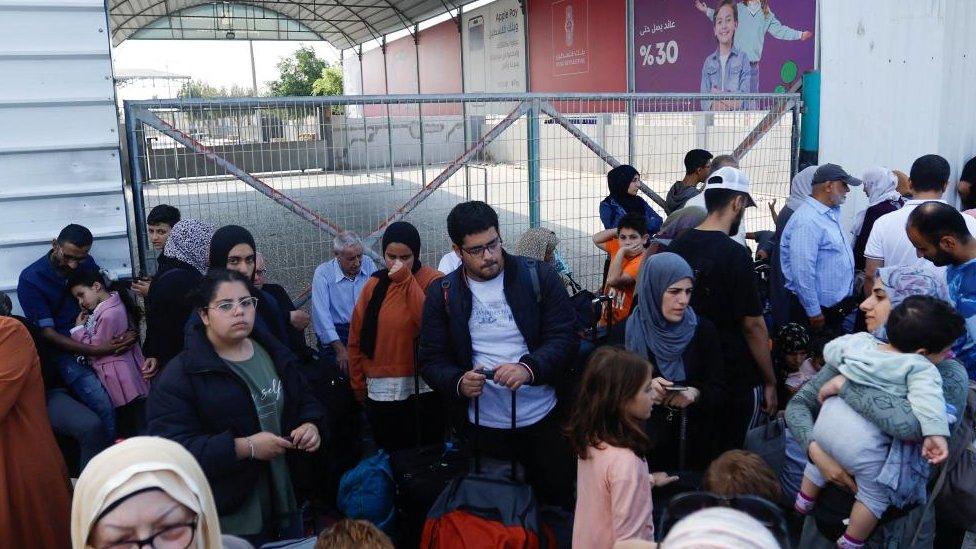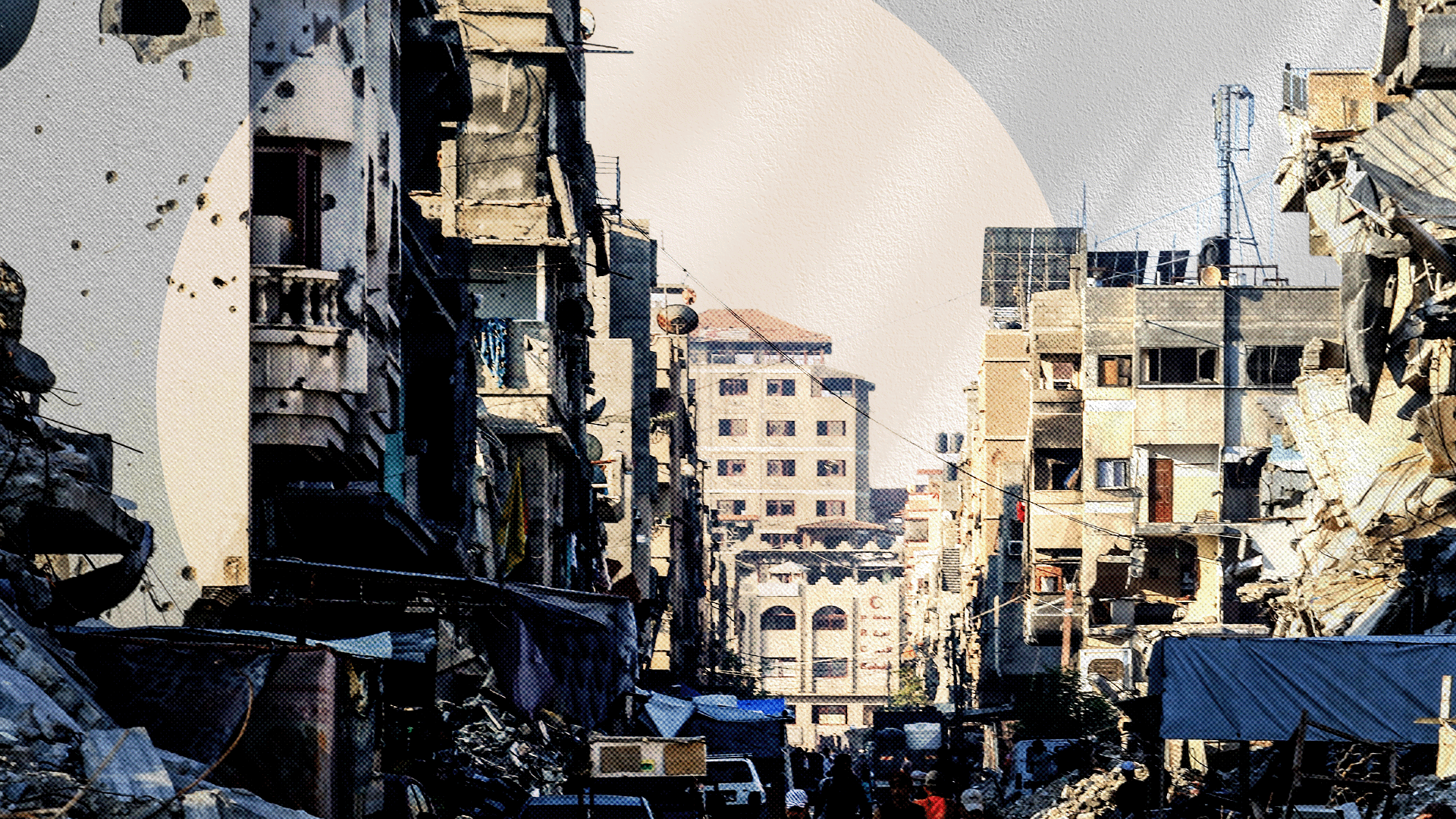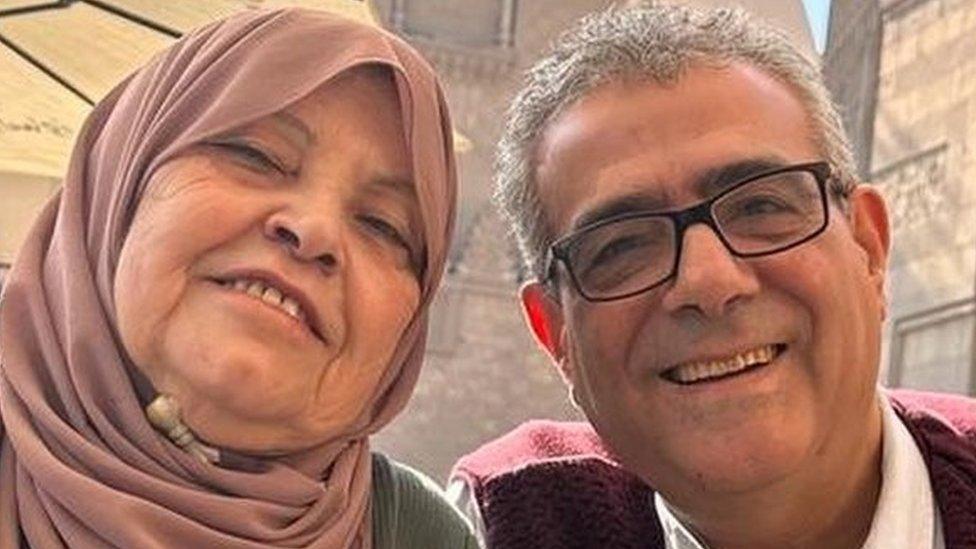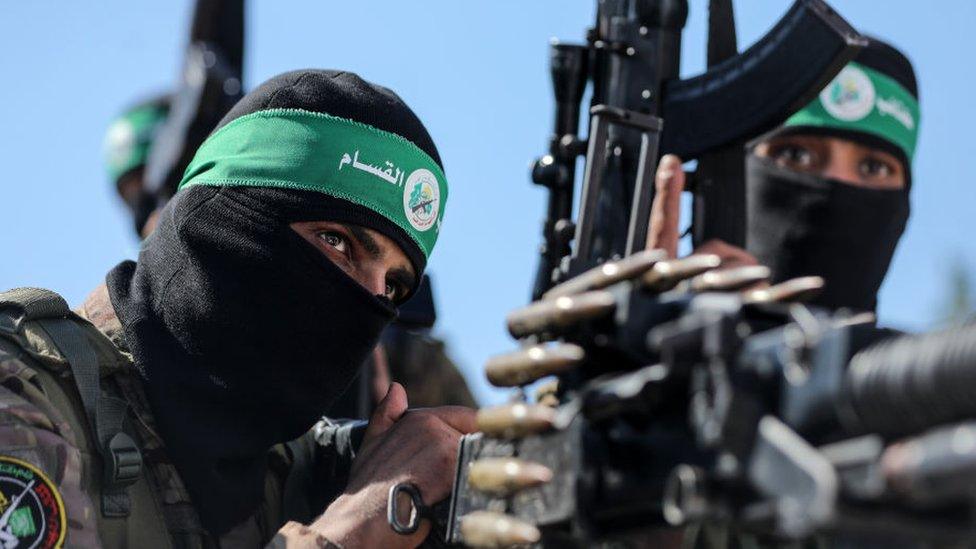Gaza: UK pushing for Rafah crossing into Egypt to open
- Published
Watch: I have the thought of me dying in a bomb in Gaza - British-Palestinian girl
The UK has "not been successful" yet in opening the Rafah crossing into Egypt to help British nationals leave Gaza, the foreign secretary has said.
British nationals have been told to be ready to use the south Gaza crossing - currently the only route out.
Hamas, Egypt, and Israel all exercise control over who can pass through.
James Cleverly said he was working with Israel, Egypt and "other leading political voices in the region" to open the crossing.
Speaking on Sunday with Laura Kuenssberg, Mr Cleverly said the gate was key to evacuating British nationals and providing "humanitarian support for the people of Gaza".
The US government is also working to try to open the Rafah crossing to allow Palestinian-Americans to leave. A statement on Saturday said that officials had been working with Egypt, Israel, and Qatar for a number of hours to try to open it.
A US State Department spokesperson said its citizens were being told to move towards Rafah because "there may be very little notice if the crossing opens and it may only open for a limited time".
Rishi Sunak met King Abdullah of Jordan in London on Sunday, with Downing Street saying they had discussed "diplomatic efforts to prevent further escalation in the wider Middle East".
The last week has seen the supply of water, food, and energy to Gaza cut off, prompting international concern about the potential for a humanitarian disaster.
British nationals are being urged to move south as directed by the Israeli government and have been sent messages telling them to be on alert in case the crossing is opened.

More on Israel Gaza war
Follow live: Latest updates
History behind the story: The Israel-Palestinian conflict
Gaza maps: What life is like in the Gaza Strip
Hamas' attack on Israel: The volunteers giving dignity to the dead

Mohammed Ghalayini, a British-Palestinian national who was in Gaza visiting relatives when Hamas attacked the south of Israel, said: "I did not get any communication about getting to the crossing - we have very patchy internet signal, so that didn't come through in time."
He said there was communication with consular representatives earlier this week "but they just diverted us to the Foreign Office registration page... I must say I'm not impressed with the way the UK government is handling this." Although Mr Ghalayini wants to stay in Gaza with his family, he says that even if he wanted to go to the border it would not be safe as it's located on a "big, exposed open road".
The Israeli government has told the 1.1 million civilians in Gaza's north to move south ahead of a ground offensive intended to target Hamas, which killed more than 1,300 people in a series of attacks in Israel last weekend.
At least 17 British nationals are confirmed dead or missing following the incursions. The UK government believes up to 60,000 British nationals are in Israel or Gaza.
Four UK government charter flights have left Israel, and two more were scheduled for Sunday.

Hamas, Egypt, and Israel all exercise control over who can pass through the crossing
When questioned by the BBC's Victoria Derbyshire, Mr Cleverly declined to say if the UK believed actions by Israel had been a breach of international law.
Mr Cleverly was shown quotes from the UN claiming Israel had put Gaza under "siege" - a breach of the Geneva Convention - and the Refugee Council, which accused Israel of a "war crime" by forcibly moving civilians out of north Gaza, ahead of an expected military attack.
Responding, Mr Cleverly said: "There are a number of other quotes which you didn't show, which don't agree with them."
Pushed again, he said: "The UK government is absolutely committed to the adherence of international humanitarian law.
"And when we see breaches of that we raise that, including with Israel."
The UK's Foreign Office said Mr Sunak had spoken to Egyptian President Abdel Fattah el-Sisi about the situation earlier this week, while Mr Cleverly was in contact with his Egyptian counterpart, Sameh Shoukry.

The in-laws of Scotland's first minister Humza Yousaf are in Gaza, where they were visiting relatives last week.
Speaking to the BBC earlier, an emotional Mr Yousaf said he had endured a "very difficult night" after his mother-in-law called to "say her goodbyes" when they were warned of an impending rocket attack. The attack did not materialise.
Mr Yousaf said he "prayed to God" they would get out alive and called for an immediate ceasefire to allow for a humanitarian corridor. The SNP conference this week unanimously passed an emergency motion sending solidarity to victims in both Israel and Gaza.
Regarding Mr Sunak's meeting with King Abdullah, a Downing Street spokesperson said: "The prime minister reiterated the UK's support for Israel's right to defend itself following last week's terrorist attack and said Hamas' abhorrent actions should not undermine the just cause of the Palestinian people."
They added that the leaders "agreed on the importance of taking measures to protect civilians in Gaza, including British and Jordanian citizens caught up in the violence, as well as ensuring humanitarian aid reaches those in need".
King Abdullah's office said his visit to London was part of a European tour intended to "rally international support to stop the war on Gaza".
He met US Secretary of State Antony Blinken on Friday and will travel to Rome, Berlin, and Paris to discuss the "dangerous and deteriorating situation in Gaza" and the "need to facilitate the provision of humanitarian aid to the Palestinians".

Are you in the region? If it is safe to do so, share your experiences by emailing haveyoursay@bbc.co.uk, external.
Please include a contact number if you are willing to speak to a BBC journalist. You can also get in touch in the following ways:
WhatsApp: +44 7756 165803
Tweet: @BBC_HaveYourSay, external
Please read our terms & conditions and privacy policy
If you are reading this page and can't see the form you will need to visit the mobile version of the BBC website to submit your question or comment or you can email us at HaveYourSay@bbc.co.uk, external. Please include your name, age and location with any submission.
Related topics
- Published16 January

- Published14 October 2023

- Published12 October 2023

